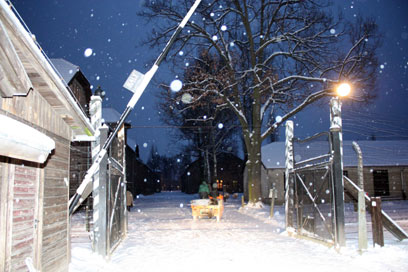
Oświęcim mayor: Sign theft wasn't anti-Semitic act
Janusz Marszalek, head of Polish town bordering Nazi death camp, defines stealing of 'Arbeit Macht Frei' notice as 'a tragedy', says residents 'shocked and saddened' by incident. German foreign minister says theft 'a despicable crime'. Holocaust survivors plan to hire private detective to help locate sign
Following a meeting with his Polish counterpart, Radoslaw Sikorski, Westerwelle said that "this is a serious act and a particularly sad crime." The Polish minister stated that the incident left him speechless. He defined the incident as a "crime" and expressed his hope that the perpetrators would be arrested shortly.
Residents of the small Polish town of Oświęcim, located near the Auschwitz-Birkenau concentration and death camp, were said to be shocked by the incident.
"This is a tragedy," Mayor Janusz Marszalek told Ynet. "The residents are appalled and very sad."
Local police have yet to locate any suspects in the incident, which took place between 3 and 5 am, but Marszalek believes it was not an anti-Semitic act.
"This makes no sense," he said. "There were Jews in the camp, but 90% of those jailed in the camp were not Jews – they were Polish, Russian and other Catholics. Only after the Wannsee Conference in 1942, the Nazis sent Jews there. Thus, an anti-Semitic motive sounds illogical to me."
He noted, however, that he had no other explanation.

Polish police photo: Gate without the sign, immediately after theft
The mayor finds it difficult to understand how someone could infiltrate the camp and steal the sign.
"There is tight security, barriers, barbed-wire fences, electronic devices and cameras. And the sign was in the middle of the camp. A regular person cannot enter. Even if a dog passes by, the alarm is sounded. Whoever did this was probably well familiar with the system. There is no other explanation," he said.
Holocaust survivor 'missed a beat'
Moshe Haelyon, 84, was sent to Auschwitz at the age of 18 and stayed in the camp for nearly two years – from April 1943 till the liberation.
"When I saw the report about the theft of the 'Arbeit Macht Frei' sign, my heart missed a beat," he told Ynet on Friday evening.
"This sign had two meanings to me. It was placed over the residential area, and we would see it when we went to work and came back. The sign's meaning is a blatant lie after all. When we walked out we would laugh about its meaning, and when we returned it was the moment of relief because we knew we would get food and be able to rest. It meant that we had survived another day."
Haelyon, a retired colonel, visited Auschwitz last year and was photographed under the sign. "This is an act of vandalism in terms of the Holocaust's memory, and if it was done by Holocaust deniers it is another despicable move in removing symbols proving that the Holocaust took place."

Moshe Haelyon during visit to Auschwitz (photo courtesy of Mizkar – the journal of The Center of Organizations of Holocaust survivors)
Polish Ambassador to Israel Agnieszka Magdziak-Miszewska said earlier that the Polish police believe the unknown perpetrators who stole the infamous sign at the entrance to the Nazi death camp Auschwitz meticulously planned out their plot because they were not caught on security cameras. The museum have workers placed an alternative sign in the camp.
Polish Prime Minister Donald Tusk expressed his profound grief over the incident in a meeting with President Shimon Peres in Copenhagen and briefed him on the handling of the affair.
"We are taking all the required steps in order to catch the criminals. In the morning hours I instructed the internal security minister, who is responsible for the police and the special security forces in Poland, to make the capture of the criminals a top priority. Poland's security forces have been dealing with this matter only since the morning hours," he said.
In Brussels, European Parliament president Jerzy Buzek, a former Polish prime minister, appealed to the thieves to return the sign.
"Give it back out of respect for the suffering of over a million victims, murdered in this Nazi camp, the biggest cemetery of humankind," Buzek said.
Polish President Lech Kaczynski said he was "shaken and outraged" by the theft of a "world-known symbol of Nazi cynicism and cruelty." He appealed to all Poles for help finding it.
Police offered a 5,000-zloty ($1,700) reward for information leading to the recovery of the sign or the arrest of the thieves.
In Jerusalem, the International Auschwitz Committee said the theft "deeply unsettles the survivors."
"The sign has to be found," said Noach Flug, an Auschwitz survivor and president of the committee. "The slogan and the camp itself will tell what happened even when we won't be able to tell anymore."
Shimon Sabag, chairman of the Yad Ezer L’Haver association, said that a delegation of survivors who were in Auschwitz would leave for the camp on Sunday and hold a protest outside its gate. Despite the investigation launched by the Polish police, he said the association would hire a private detective to help locate the stolen sign.
'Museum workers devastated'
Christina Oleksy, deputy director of the Auschwitz Museum, was also shocked by the theft. "I can't comprehend, not even in my imagination, how someone could steal the sign," she told Ynet.
"How much hatred could a person have to do such a thing? It's not vandalism – that would be an understatement. The sign was the very symbol of the memorial, of Auschwitz and of the entire Holocaust."
According to Oleksy, "All the people working in the museum are devastated and disgusted, even personally hurt. We dedicate so many efforts to protest the museum, and I have personally worked here my entire career in order to fulfill the survivors' wish to preserve the camp as a memorial site.
"When Auschwitz was liberated in 1945, they did everything possible to preserve the documents testifying to what happened here forever. People are working very hard to preserve this, even volunteers, because it's a commitment for the future. Now this testimony has been badly damaged. It's a tragedy, and I have no other words to describe it," she concluded.
Yael Branovsky, Ronen Medzini, The Associated Press and AFP contributed to this report










